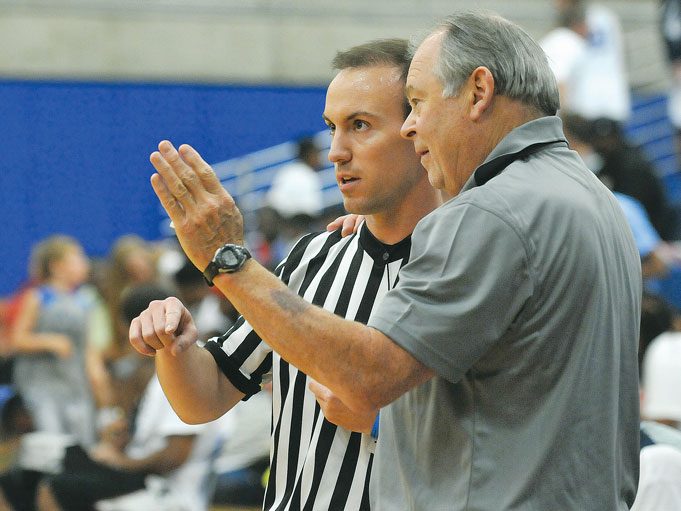Whether we’ve been officiating for some time, figure ourselves to be seasoned vets or we simply have three more games under our belts than another official, we’re in a position to instructors and to teach, mentor and make other officials better.
Our egos (substantial as they may be) often don’t match up with our innate abilities to convey information, although we enjoy the opportunity to do so. Many of us practically force our stories and instructions on our fellow officials, knowing in our hearts they need our hard-earned knowledge lest they fall off the officiating radar forever.
Scripture has a nice parable about sowing seeds on fertile ground, however, and many of our intended pupils are more like the fallow earth when it comes to intake of knowledge. So therein lies your unasked-for advice on how to be an excellent mentor, no matter your skill level.
Ever been to an officiating camp? Watch the campers. Each of them paying great amounts of money to be exposed to select instructors and famed assigners, they will spend hours in the corner instructing by themselves. Don’t kid yourself — everyone fancies himself or herself an able teacher, and you’d be amazed at the sheer amount of misinformation spilled into waiting brain cells on a daily basis throughout the year.
Make certain the soil is fertile and ready to germinate the seeds of information. It doesn’t matter how awful the official is, or how badly they need to learn. If they are of a closed mind, nothing you say will sway them.
Start by asking, “So? What level do you want to end up as an official?” If they wish to move up, you will next say, “I can help you get there. Here’s some tips that helped me.”
Information must come from a level of power.
Represent the information or yourself as having some force from beyond that makes the information you have important to the person you’re sharing it with. If you’re the assigner or paid evaluator, well, there you go. Otherwise saying, “I just learned this at camp” adds cache to your tidbit, enough to make the learner more impressed and more than yearning to listen.
Even if you are the evaluator or assigner, remember the ego factor. Every official has one, and the higher their level, the larger their ego. Sugarcoat the information, remembering you are there to help them improve, not to condemn them as officials (unless you are there to fire them, in which case have a heart and leave the notes at home).
That doesn’t mean you should just start with something positive so you can move on to the negative. It means trying to meld every comment with a stir-fry of boost. “I wish every official in my association had your mechanics. Then if you could mix those mechanics with the ability to hold your whistle another second to see the play, you’d be unstoppable.”
As a younger official, you still have insights to share, even with the best. Ask the veteran, “Hey, I saw something in your game out there. Can we talk about it? I want to know if I’m right.”
Of course the vet will want to help you, and will say, “Sure!”
The next point is crucial. While many officials are licensed and trained educators, most are not. Teaching colleges train instructors to break down information into lesson plans. Officials, on the other hand, often tend to become spillways of information, using any opportunity to give you tons of information at once.
There’s just so much any one brain can handle, and even younger officials can only absorb so much into their gray matter at one time. You have to identify the issue at hand and break down the lesson to help them improve. You can briefly mention the goal, but give the information to get there in increments, doable peaks for the official to climb.
“Hey, remember, it takes about five years to be a really great official, and you’re on your way for sure. But first you’ve gotta have that loud whistle and loud voice. Add that to a sharp signal and you’re set for the first year! Let’s hear your best whistle.”
It works for high-level officials as well, and you have the luxury of being even more technical based on their experience.
“Don’t you think?” is a great line. Unless you’re the camp counselor or evaluator, show that you’re working with your fellow officials to get them to improve. Ask follow-up questions and meet at the plane of discovery together. “Doesn’t that feel much better?” “See how holding the whistle allowed you to pass on that play?” “Man, you’re getting better at seeing the whole play when you referee the defender.”
Know your audience.
Teachers in a classroom have to work generically in large groups, but can really shape their message when they get the individual student alone. That’s when the instructor can use all of his or her knowledge about the student to dig into his or her bag of teaching tricks.
Let’s face it, some people aren’t the keenest of learners. Some are visual learners, some have to actually perform the task to get it and some … well, some folks just have passed the point of learning altogether. That doesn’t mean you can’t offer them some hope.
There’s a special time, an eerie quiet that happens when you are speaking and everyone in the place is hanging on every word. It tells you that your tone has been perfect, your message taken, your advice crucial. Your goal is to get to that point in the locker room or in the corner of that court each and every time. It tells you perfectly how well you’re doing as an evaluator, that you have measured your advice and your students well, their eyes are clear and are watching yours.
It tells you that you are right where you belong, and so are they. Most importantly, it tells you they will enact what you’re saying as soon as possible, and truly will take the next great step forward as an official.
That’s the ultimate praise for you as a mentor: to see the seeds you’ve planted grow and carry the stripes to the sky (or to the championship). Your role in their growth might be forgotten, but you’ll know what you did and why — enough to feed your ego for years to come.
What's Your Call? Leave a Comment:
Note: This article is archival in nature. Rules, interpretations, mechanics, philosophies and other information may or may not be correct for the current year.
This article is the copyright of ©Referee Enterprises, Inc., and may not be republished in whole or in part online, in print or in any capacity without expressed written permission from Referee. The article is made available for educational use by individuals.

















